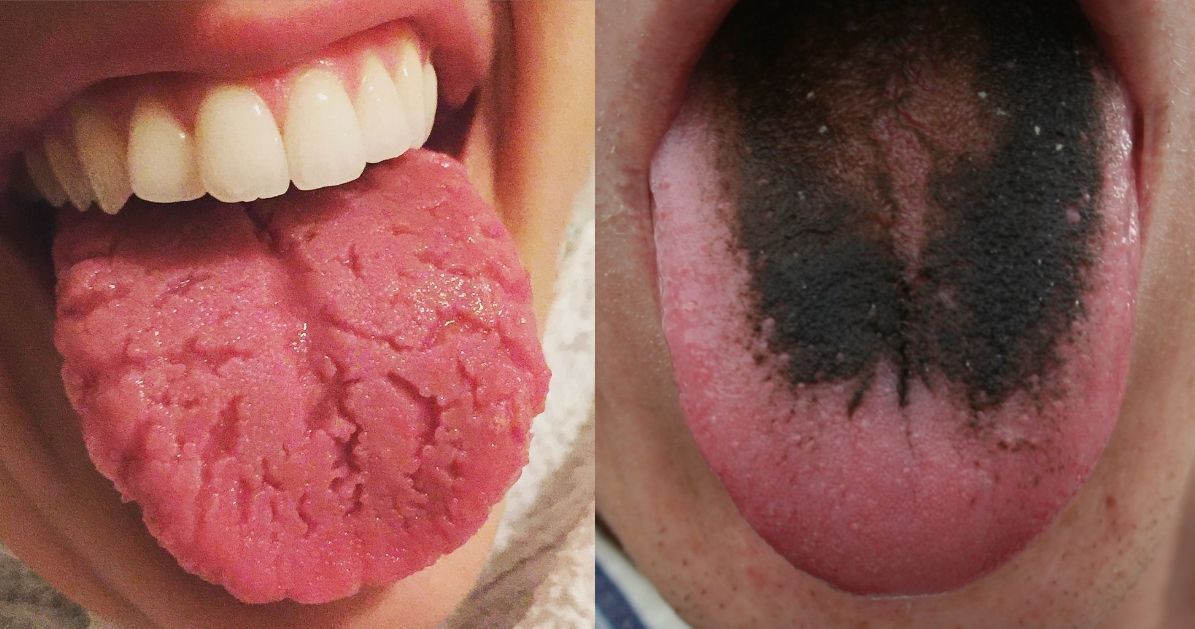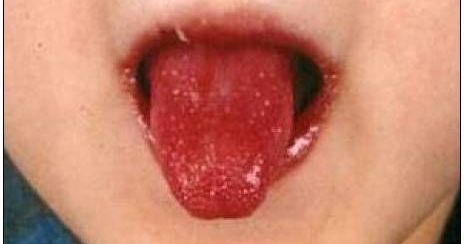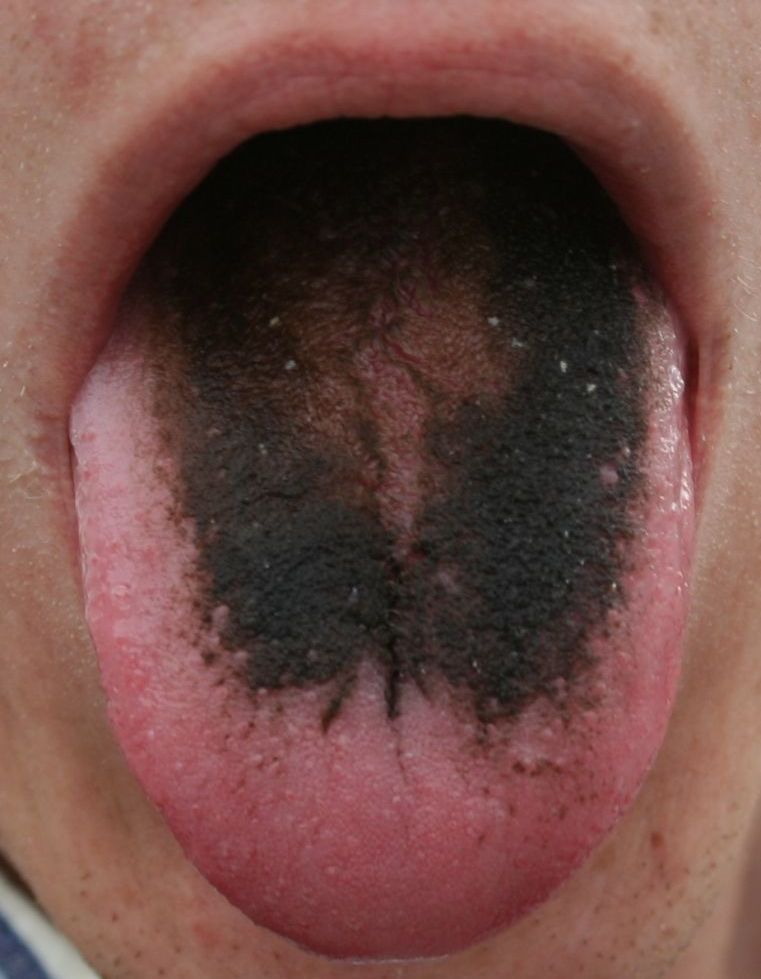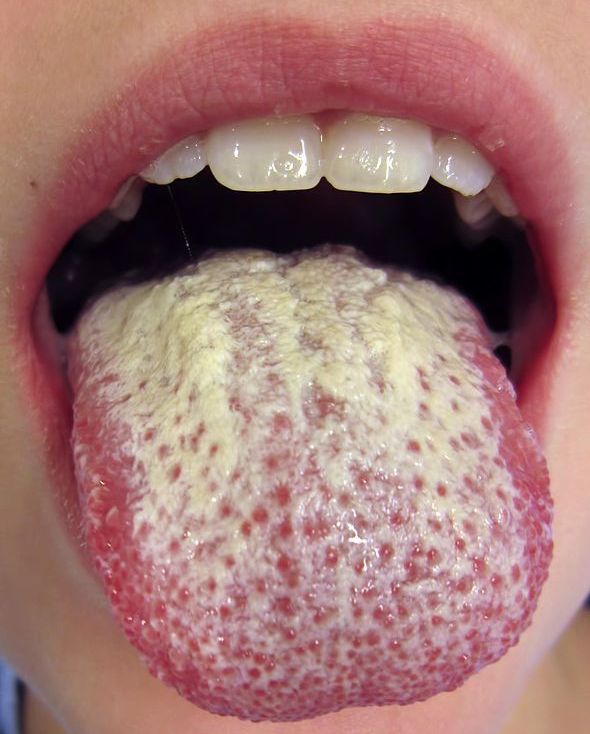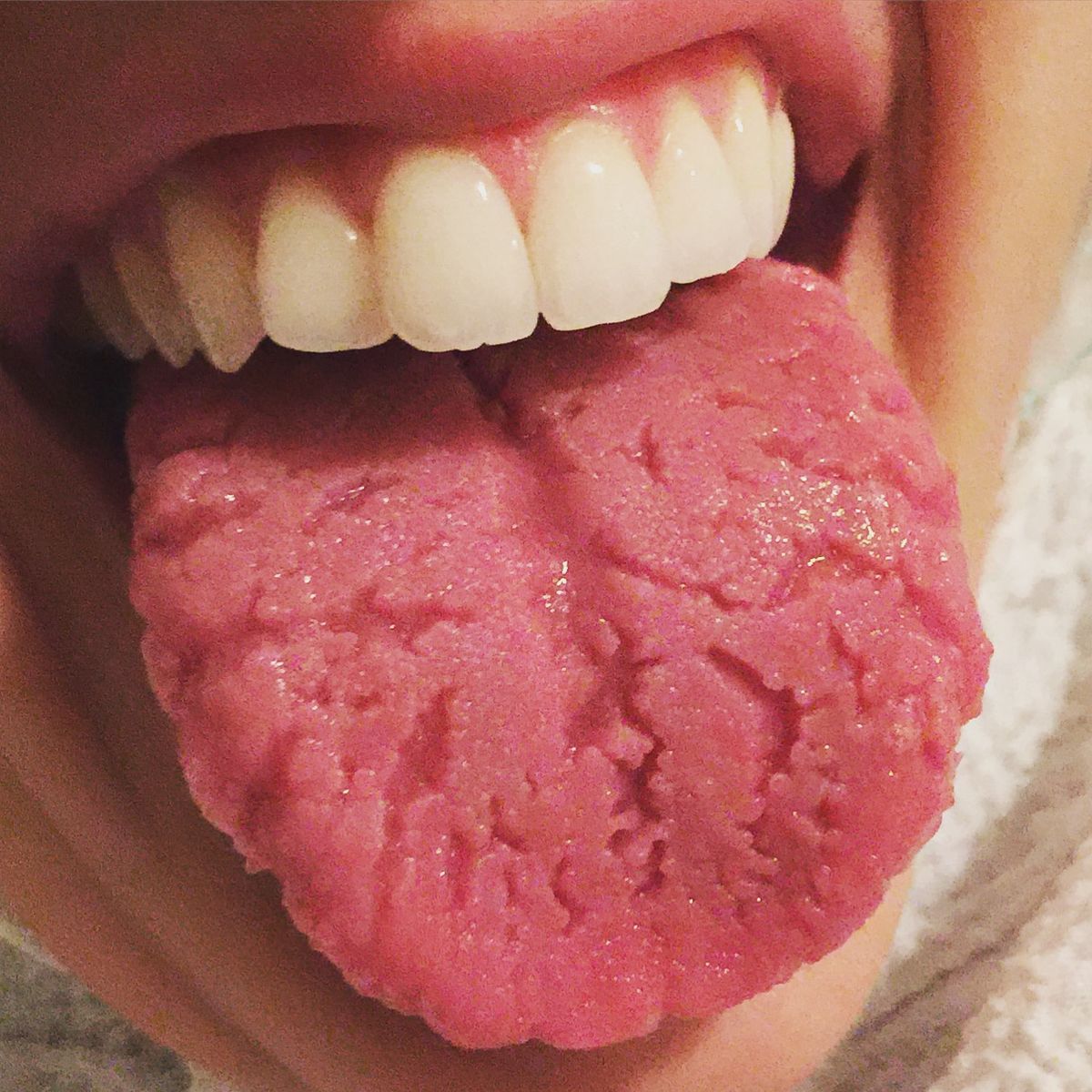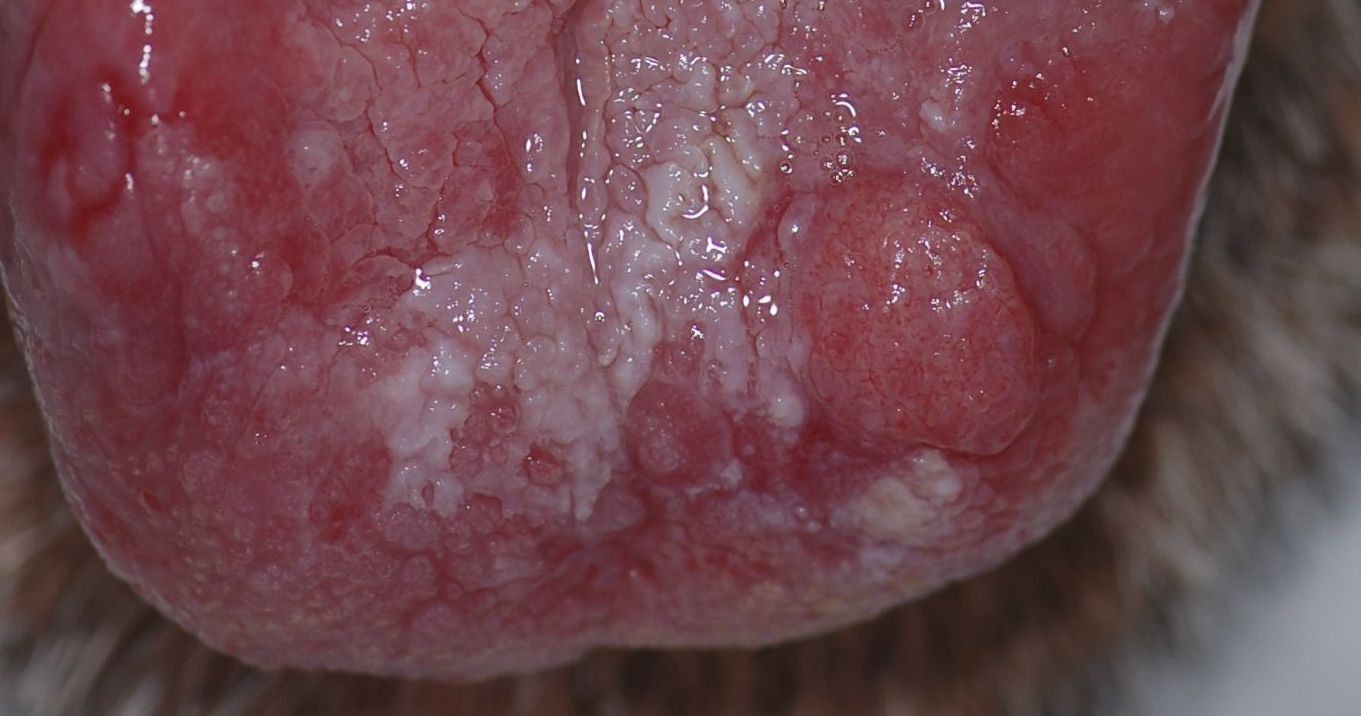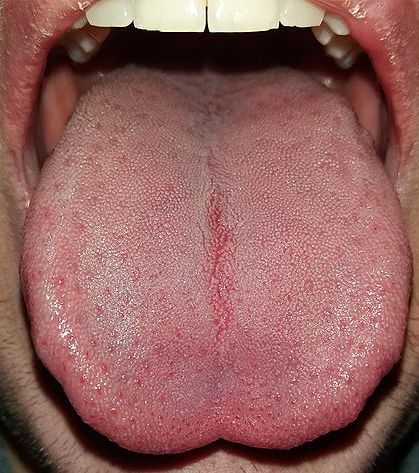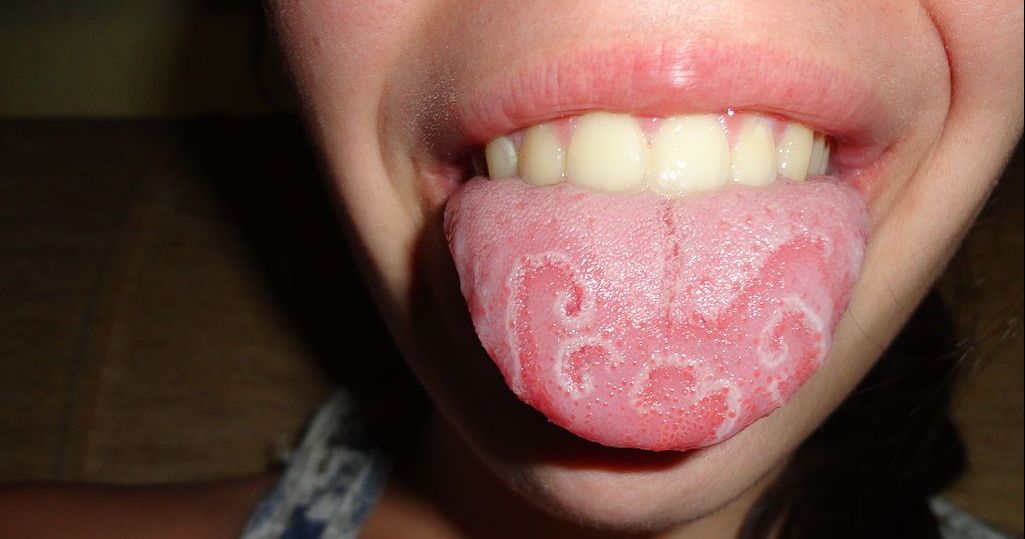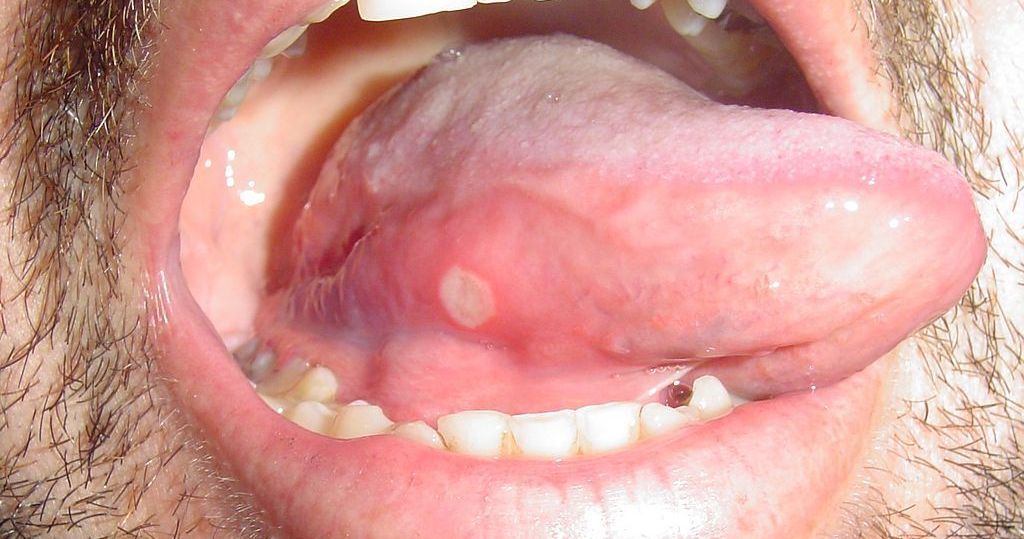So you see something out of the ordinary when you stick out your tongue?
Whether it's a discoloration or a new bump, tongue pain is hard to ignore. Check out these common indications that something may be wrong with your health.
Red Tongue
A healthy tongue is a rosy pink color, so if you notice your tongue has become red, you may want to pay attention and potentially take action.
If your tongue is strawberry red in color then you could have a vitamin deficiency. A glossy, bright red tongue may be a sign that your body is lacking iron or B12. "Vitamin B12 and iron are needed to mature papillae on the tongue," says Naomi Ramer, DDS, director of Oral & Maxillofacial Pathology at Mount Sinai Hospital. "If you are deficient in those vitamins, you lose those papillae, which can make your tongue appear very smooth."
If you end up with a smooth tongue, it can cause pain while eating hot liquids or spicy foods. A vegetarian diet can leave people especially prone to low levels of B12, which is typically found in certain meats. "If you notice your whole tongue is a strawberry red color, and you are a vegetarian, ask your doctor about taking supplements," says Dale Amanda Tylor, MD, MPH, general and pediatric otolaryngologist at Washington Township Medical Foundation.
Brown or Black Fuzz
If your tongue has brown or black fuzz it could mean that you don't have the best oral hygiene. While a tongue covered in dark hairs may look unappealing, doctors agree that it's not a cause for major concern. "We have papilla, small bumps on the surface of our tongue, which grow throughout our lifetime," explains Ada Cooper, DDS, an American Dental Association consumer advisor spokesperson and practicing dentist in New York City.
Usually these papillae are worn down by chewing and drinking, but sometimes they can become overgrown which allows the to harbor bacteria or become discolored by food. This can cause bad breath and change the taste of your food.
"Typically [black and hairy tongue] is brought on by smoking, drinking coffee and dark teas, or poor dental hygiene," says Jack Der-Sarkissian, MD, a family physician with Kaiser Permanente in Southern California. "Removing the offending cause, like smoking, and brushing the tongue or using a tongue scraper, may be all you need."
Cottage Cheese White
If your tongue looks like it has a layer of white cottage cheese on it, it could mean you have a yeast infection. A lumpy, white coated tongue could be thrush, an oral form of a yeast infection caused by an overproduction of candida. "Your tongue is home to naturally occurring bacteria and yeast. When you take an antibiotic, which selectively kills off bacteria, it can allow yeast, which is not killed by antibiotics, to take over," says Dr. Tylor.
Thrush is common among young children and needs to be treated with over-the-counter products.
Wrinkles In Your Tongue
Much like the rest of your body, wrinkles in your tongue can be brought on with age. Fissures and cracks in the tongue are typically harmless, but problems can come up if poor dental hygiene allows an infection to grow in the crevices. "Once in a while a fungal infection can develop inside the clefts," says Dr. Ramer. "You will suddenly have pain, a foul smell, and sometimes burning."
You can often treat the infection with a topical antifungal medication.
Some dental appliances, like dentures, can also cause indentations on the tongue. "Make sure your dental fixtures fit well, drink enough water, and practice good oral hygiene like brushing your tongue," says Dr. Der-Sarkissian.
Small Patches of White Underneath Your Tongue
If you come across small patches of white on your tongue, it means something is irritating your mouth. These white patches are caused by an access growth of cells, and is often associated with smokers. These lesions have a five to seventeen percent chance of developing into cancer. "If you're a smoker, this is your body telling you that it's starting to develop these precancerous lesions," says Dr. Tylor.
Typically this condition can be reversed when you stop smoking.
Not a smoker, but still have this symptom? "The patches can also sometimes result just from the abrasion of the tooth constantly rubbing against the tongue," says Dr. Cooper. "But if it doesn't go away in a week or two, it's extremely important to see your dentist, who might recommend a biopsy."
Persistent Red Lesions
Not to be confused with a canker sore, these red lesions could be a sign of tongue cancer. Typically canker sores disappear after a few weeks, these red lesions or patches tend to stick around and prove to be something much more serious. "With tongue cancer, you often think of an older, unhealthy person," says Dr. Tylor. "But if you're young and healthy and you have these, it doesn't mean you're OK. I've seen it in a 17-year-old girl."
Typically oral cancer caused by smoking, but it can also stem from the HPV virus. Get it checked anyways, because most oral cancers don't hurt in their early stages.
Burning Sensation
If you tongue stings and burns as if it has been scalded, but it looks completely normal than it could just be hormones to blame. Or the wrong toothpaste.
Burning tongue syndrome can happen to anyone, but it is seven times for likely to happen in women then men. There is no particular reason why it occurs, or why it goes away for some but not for others.
Hills and Valleys
It's very normal to have what is referred to as a "geographic" tongue. Typically harmless, this texture effect affects between 1 and 14 percent of the U.S. population. The reasons for the hills and valleys is unknown, but some causes can be linked to taste buds. "Taste buds sometimes can randomly shrink away," says Dr. Tylor. "They can regenerate, so some go away and some don't."
This typically doesn't require any treatment unless it becomes painful.
Painful Sores
If you have painful sores on your tongue, it could mean that you're stressed. Most people have had to deal with the unpleasant feeling of a canker sore on their tongue or cheek, at one time or another. They are typically only painful for the first four to five days, and typically disappear within two weeks. We don't really know why people get canker sores, but it's probably something viral," says Dr. Tylor. "People who are run down or stressed are prone to these ulcers."
The good news is canker sores are not contagious compared to a cold sore which is extremely contagious.
Share this with a friend!
H/T: Reader's Digest
